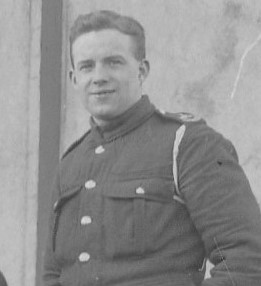
Mairi Featherstone visited the museum to see if we could find out a little about her grandfather, David Logan’s First World War service.
After a some investigation, it became clear that he had been in the Royal Field Artillery. On of the original postcards revealed that he had been at Scotton Camp (it is inscribed with “Cooks and Waiters, Sergeant’s Mess, Scotton Camp, Yorks 19/6”), which was eventually absorbed into Catterick Camp during the war. No 5 TF Artillery Training School was based at Scotton Camp in 1915, which is the most probable reason for his time there.
David’s medal card shows that he was in France by May 1915. There are two regimental numbers on his medal card, an early number, 971 referring to the Territorial Force RFA and a second reference 645569.
645569 Gunner David Logan was entitled to the 1915 Star, the British War Medal and the Victory Medal at the end of his war service.

An unusual group photograph – David is on the right

David Logan at Scotton camp
Explore more memories from the ribbon
-
Edward Methuen Stone
The Green Howards Museum’s Fiona Hall shares her thoughts about Edward Methuen Stone, her maternal grandfather: “This picture shows my grandfather, Edward Stone, with my Mum on her wedding day in 1960. Edward was born in St Mary le Bow in London in about 1900; in the 1901 census he is shown as living with his parents and three older sisters – Eliza, Emma and Julia, and a brother, John in Armagh Road. There is absolutely no existing anecdotal information regarding Edward’s war service within our family. My older cousins, who knew their granddad as young children, can’t remember anything ever being said about it. My grandfather died ten years before I was born, and I can only remember my Mum saying what a kind and gentle father he was. My great uncle John was ten years older than Edward. It seems he served in the Royal Engineers and also survived the war. No service record exists for Grandad Stone, so we do not know when he enlisted or was demobbed, or precisely where he served, his medal card shows he was a Private in the Norfolk Regiment. A researcher at their regimental museum managed to find just one intriguing reference to him. On the 10th of October 1916 he is recorded as being in 23 Base General Hospital, Amara, Mesopotamia with a ‘slight gunshot wound’. That’s it. There’s nothing else. The boy from Bow was in what’s now Iraq! Needless to say my cousins are gobsmacked. How could we…
-
George and Gertrude Laws, and their children
Submitted by Mike Crisp. Private 47165 George Laws was by trade a painter and decorator from the small market town of Beccles, Suffolk. He joined the 22nd Battalion, Northumberland Fusiliers (Tyneside Scottish) and served in France. On the opening day of Operation Michael, 21st March 1918 his battalion was in the front-line trenches around St Leger / Bullecourt where he was reported missing. His body was never recovered, and he is commemorated on the Arras memorial. According to the battalion diary they suffered 1,130 casualties on that day. George’s wife Gertrude, was heartbroken and never gave up hope of her husband being found, writing to the War Office on several occasions to try and gain more information. It was not until many months later friends of George visited her to relate that George was a member of a bombing party which went to a flank and were never seen again. Not only was Gertrude in mourning but also on the poverty line, forced to bring up 2 small children on her own. To help make ends meet she took in washing, sat with the dying, and laid out corpses for the local undertakers. Her son became the surrogate ‘man of the house’ and it was not until 1968 that he felt that he could leave his mother to get married himself. Gertrude died at the age of 97 in 1977.
-
General Sir E S Bulfin KCB CVO
Bulfin was born in Woodtown Park, Rathfarnham, Co Dublin in 1862. Although he attended Trinity College, Dublin, he did not take a degree, choosing a military career instead.He was commissioned into the Princess of Wales’s Own (Yorkshire Regiment) in 1884. After 30 years of service he became Colonel of the Regiment in 1914. As Colonel, Bulfin wanted the Regiment to stand out in the Army Lists with a more unique name. He pushed for the traditional nickname of ‘The Green Howards’ to be made official to differentiate between all the other ‘Yorkshire’ Regiments. He was finally successful in 1921, and the name lasted for the next 85 years.
